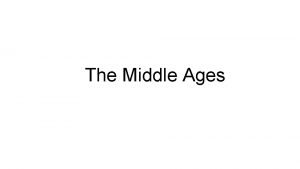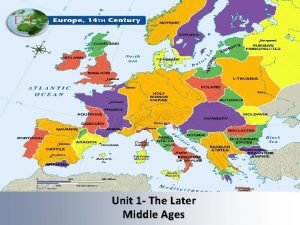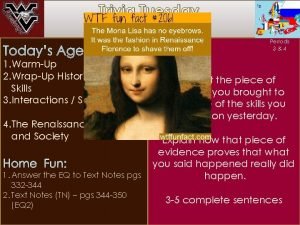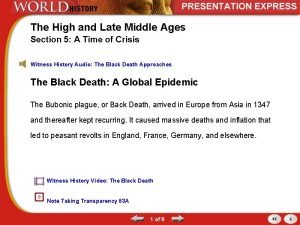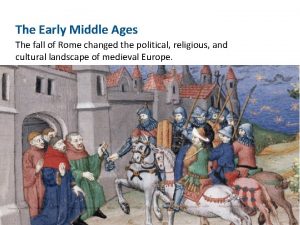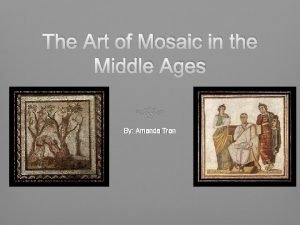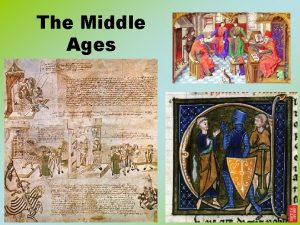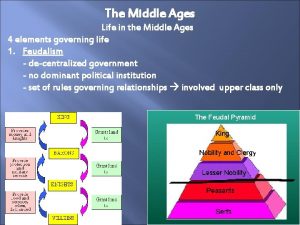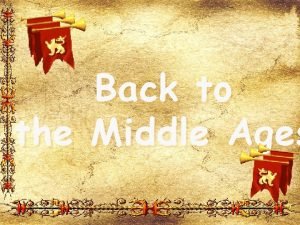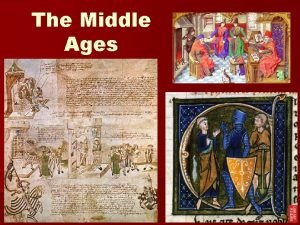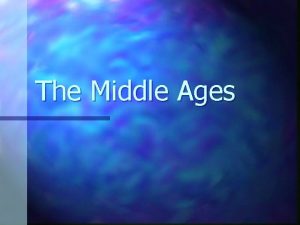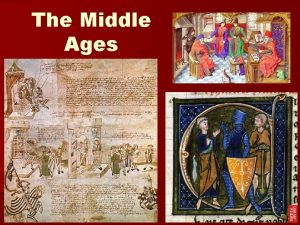Everyday life in the Middle Ages Was Life










- Slides: 10

Everyday life in the Middle Ages: Was Life for ordinary people over the course of the Middle Ages always hard and Miserable? Would you have coped living the Middle Ages? You might expect medieval life to be miserable. Consider the prospect of working hard on the land all day and then going home to a bowl of tasteless vegetable soup and a straw bed on the floor. However, as you will discover, Britain in the Middle Ages was not the backward society of its stereotype. The strict hierarchy of the feudal system can certainly be seen in the lifestyle and conditions of medieval people, but times changed. Over the period, the population rapidly increased then decreased in size. Although remaining a largely rural country, Britain’s towns grew, as did trade and wealth. People had new challenges to face. You can judge for yourself whether medieval life was as grim as the stereotype. Was life comfortable, peaceful, boring, dangerous?

(1) Everyday Life in the Towns: Was life for ordinary people in the towns stinky and tough? (2) Health and Hygiene: Was life for ordinary people dirty and dangerous? (3) Everyday Life in the Village Was life for ordinary people in the villages hard and miserable? Seasonal work calendar (4) Women and Children in the Cleanliness Development and growth Health Freedom Treatment and cures Opportunities in the towns (work, leisure, fashion, food) Surgery and medicine Tip: STEP 1 SELECT: A little research can Choose a topic & Question which help you to decide … interests you … Freedom and justice Housing and homes Middle Ages: Was life for women and/or children oppressive and dull? Role of women Life for children Wealthy and poor

#1 Medieval Towns #2 Medieval Manor Everyday life in the Middle Ages #3 Medieval Medicine BBC Teach #4 Day in the Life 10 year old

LOWER ORDER QUESTIONS: Who? What? Where? When? HIGHER ORDER QUESTIONS: Why? How? STEP 2 ENQUIRE: Ask the right kinds of questions HIGHER ORDER QUESTIONS: How Significant was? To what extent did? How important was? Check: Ask LOWER ORDER questions to guide your factual note-taking. Break down the HIGHER ORDER QUESTION into more manageable questions… CHECK POINT … PREPARE FOR THE END: Have you got to the nitty-gritty details? Have you considered how much the conquest changed us? Have you learnt anything that surprised you? What further questions did your research give rise to?

Everyday Life in the Towns Was life for ordinary people in the towns stinky and tough? Were towns were visiting? How did towns develop and grow? How free were people in the towns? Were there more opportunities in the towns (work, leisure, fashion, food)? Tip: A little research can help you to decide … Health and Hygiene: Was life for ordinary people dirty and dangerous? Did people try to keep clean and healthy? Were the Middle Ages ‘stinky and deadly’? Could Medieval people cure the sick? How limited were treatment options? More Questions to help you think! Everyday Life in the Village Was life for ordinary people in the villages hard and miserable? Did farmers have a hard life? Was life the same all year around? How restrictive was life in the village? Were homes uncomfortable for everyone? Women and Children in the Middle Ages: Was life for women and/or children oppressive and dull? How was the role of women restricted? Were women less important than men? How different was life for wealthy women? How different was life for wealthy children compared to the poor?

MORE ACCESSIBLE READING: Trip to the LRC MODERATE READING: STEP 3 INVESTIGATE: Read, Think, Notetake! Fill in your learnig LOG AIMING HIGH READING: BBC History Magazine History Today AIM: To read between 2 -4 different sources of information (e. g. pages from a textbook or an article) You MUST read from at least two different boxes OTHER: Websites must always be credible Historylearningsite. co. uk Spartacus educational

STEP 4: Note-taking Consider what you are trying to find out first Prepare how you are going to take your notes (e. g. a table or a spider-diagram to separate information) Read without taking any notes (this may be skim reading) Use short, bullet points to write down what will help you to answer your enquiry questions (avoid copying but short quotes can be helpful ‘don’t forget to use quote marks’ and note where the quote came from p. 17 SHP textbook) If you can, use highlighters or underlining to emphasise parts in the text which are important and relevant to your investigation Fill in your reading log (which pages did you read, was it helpful? )

CREATIVE: Remember you have limited TIME and must ensure that your project answers your enquiry questions LOGICAL: Your presentation method should display your learning in a clear and thoughtful way and show you have been CRITICAL and CURIOUS STEP 5 PRESENT: Creative, Logical and Individual! INDIVIDUAL: Be BRAVE and try presenting your work in a different or unusual way LEARNING LOG: A VERY important part of your project – you will fill this in as you go on your QUEST. . . And hand it in with your final project

Presentation Ideas What are your ideas? Short essay to answer enquiry questions Table / Chart / Pyramid to answer enquiry questions Mind map to answer your enquiry questions Questions answered by a Medieval character (e. g. as narrator, interview, diary, play) Textbook Style presentation to answer enquiry questions Collage / storyboard / comic strip to answer each enquiry question

My Courageous Quest in overview Expectations and limits: Class time to set up Quest; LRC lesson and note-taking skills; 4 home-works Presentation of findings: 1 -3 pages A 4 size Minimum 400 words, maximum 800 words. Include pictures / drawings Research material: LRC and History ‘Box’ Complete your Learning Log
